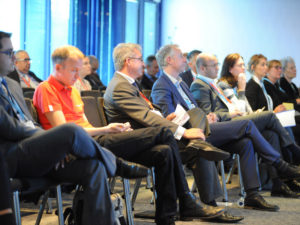‘Total cost of mobility’ approach is key to cutting costs
Driving cultural change by focusing on ‘total cost of mobility’ rather than a fleet-based total of cost of vehicle ownership model can help firms cut costs and reward employees.

ACFO Autumn Seminar delegates heard how identifying journey cost is key to implementing business mobility solution
At this week’s ACFO autumn ‘Drive for Mobility’ seminar, corporate mobility experts told delegates that the implementation of a ‘door-to-door’ mobility cost model approach to travel was in its infancy, but would be become the norm within the next three-five years.
While there is an acknowledgement that job-need company cars will be “here to stay”, Graeme Banister, consulting director at global research and consulting organisation Frost & Sullivan, said: “Mobility is here. What’s changing is the way mobility is delivered and for fleet managers and companies there is an opportunity to deliver mobility to all employees.
“Transport has been treated with a silo mentality and it is either public or private. But there is now a move to a total cost of mobility concept and the importance of understanding the full cost of travelling from A to B.”
Delegates also heard that some companies were already on the road to driving the change, with the merger of fleet and business travel departments enabling managers to have a complete picture of all journey and related expense costs, including hotel bills and meal claims as well as expenditure relating to car parking, taxi fares, flights and rail tickets.
One of the key drivers behind focusing on mobility as a service (MaaS), in addition to driving down the cost of corporate travel, is to deliver an increasing array of benefits to all employees, not only recipients of a company car.
Justin Whitston, chief executive of MaaS platform provider Fleetondemand, which supported the seminar alongside LeasePlan UK, said: “MaaS will underpin what drives future cost of smart mobility solutions. It brings together all forms of transport in one platform.”
Describing how a single online platform could be used by organisations and their employees to “find, book and pay” for all travel and related costs, he said: “MaaS is taking the personal and business objectives and delivering the best mode of transport for each particular journey.”
The seminar heard that cultural change could be driven by employers if they shared some of the cost savings achieved by encouraging staff to choose the most cost-effective journey solution.
Graeme Banister said: “Employees must be empowered to make choices and that can be encouraged by enabling them to share in the savings.”
The seminar also set out the view that corporate fleet and travel departments will merge in the next two to three years and looked at the need to have tools available to identify the “total cost of a journey not simply the headline cost of a rail ticket, flight or car’s pence per mile figure”.
ACFO chairman John Pryor commented: “Fleet managers should know the total cost of ownership of company cars, but when looking at business mobility they need to know the total cost of a journey so the full cost of business travel can be identified.”
Pryor suggested the next step was to introduce technology to facilitate online travel bookings and embrace interconnected apps that provided information to employee and added: “Business mobility is about giving employees the widest possible choice, while making travel cost effective and efficient. It is more than just trains, planes and automobiles.”

















